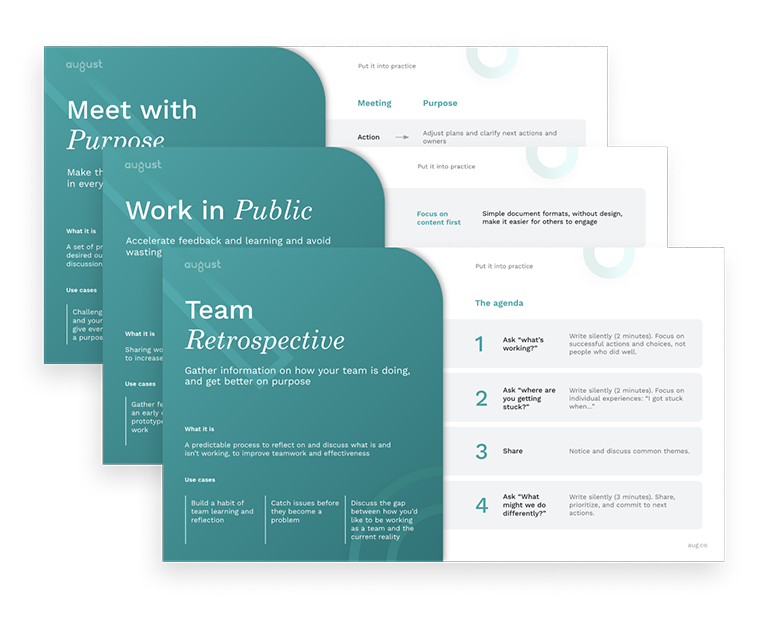Published April 23, 2021 | Updated April 23, 2021 | 8 minute read
This document was written for new hires to read in their first few weeks at August. In line with our core value of working for the public benefit, we wanted to share it publicly so that we can invite other organizations to benefit from it.
Welcome to August. We’re a self-managed, self-organized company, and we’re excited to have you as one of our new team members! The purpose of this document is to clarify what we mean by self-managed & self-organized, how it shows up at August and provide some resources where you can find more information.
At its most basic level “self-management” means that power traditionally held by “managers” is decentralized through the organization. At August, you don’t have a boss, or a line manager and the responsibilities that a traditional manager may have played are distributed amongst our team members (including yourself!). “Self-organized” means that our organizational structure doesn’t come from a top down mandate, but is created through our peer to peer interactions (which you will see in action at a governance meeting!)
We’ve developed this system over time with inspiration from various organizing systems like holacracy, sociocracy, lean and agile, but largely, we’re curating and crafting our own way of governing and being governed.
Since one of our baseline expectations of all team members is your ability to navigate our system, this document is a short primer of FAQs on Self-Management & Self-Organization.
Why have we chosen this way of operating?
We believe that self-management benefits our organization in three specific ways:
- Engagement - We assume our team members are internally motivated, enjoy their job, and will work to better themselves and the organization without needing to be explicitly directed by a “boss.”
- Agility & Resilience - Self-management makes us able to sense and respond to change quicker, by distributing authority throughout the organization. In uncertainty and change we can edit our structure to make us more adaptable
- Equity - A clear and explicit organization structure is more inclusive of all members, since it reduces the power that is traditionally held by those “in-the-know” when structures and authority are implicit.
What are some fundamental components of our system?
The most important component of our system is Purpose. The overall purpose of August is “a capable team for every meaningful mission.” This large and broad purpose is broken up into several smaller and more specific purposes that help us achieve this vision. Each smaller, specific Purpose then becomes the responsibility of one Team in our system. For example the Accounts team purpose is: ”A profitable business offering that delivers transformative change to leading organizations.” and the Belonging team purpose is: “ Ensuring a healthy culture that is true to August’s values” You can read each team’s unique purpose in Glassfrog.
Although each teams purpose is defined by the API team, It’s up to each team to unpack the purpose into Roles and Accountabilities that they see fit. Each of us holds multiple roles in multiple teams at August. Roles vary in time commitment required. You’re responsible for prioritizing your own work, across different roles,
So who gives me permission to do things?
.jpg?width=960&name=Untitled%20presentation(2).jpg)
Of course, you are welcome to seek advice and input, but at August, members are expected to take any action they believe will help move the organization toward its purpose, as long as it isn’t explicitly forbidden by a domain (an area of the business that is controlled by one team) or a specific policy. Domains and policies are captured transparently in Glassfrog.
If you’re unsure, or if it’s a decision that will impact the team more widely, you can and should ask your team members for advice, and they will give input and have an impact on your decision. But ultimately, if you own that responsibility or domain, you make the final call. Since you’ve been placed in that role, your team members have essentially consented in advance to your decisions - and there will definitely be times where you won’t integrate their advice. The same thing will happen to you.
In addition to taking action, when you are fulfilling your roles you are expected to notice tensions (gaps, issues, and opportunities) in our systems. When you identify a tension with our systems you are expected to proactively bring a proposal designed to solve the problem and drive change. Proposals are processed using a governance process we call ‘consent’.
In consent, the bar for someone actually “blocking” a decision that you make is very high - specifically, only if they have evidence that letting the decision happen will cause harm to the business, or isn’t safe to try. Think about that - sure, there are a lot of decisions which might not be the best idea to move forward with (in your opinion or in others’ opinions), but there are few that would actually cause real harm. It’s an entirely different way of looking at responsibilities and how we function as a team.
In the world of self-management, there are no best or right ideas - the assumption is that the starting place is always wrong. And if a team member “owns” the decision rights for a domain or is the one making the proposal, it’s their prerogative to integrate feedback that they find useful or dismiss feedback that they feel isn’t helpful. So be ready for some uncomfortable moments where you’ll have to put your ego aside and “consent” to something that you might disagree with. On the flip side, if you sense tensions within the system or believe that something isn’t safe to try or will cause harm, be ready to bring that perspective forward and make a case, even if you are the only one holding that perspective.
What does all of this mean for you? Well, chances are that if you’re starting at August, you’re someone who has a proven record of taking initiative and having a bias for action. You’re creative and flexible; someone who has fought for change within big companies and knows how to navigate complex systems. And you’re going to need every one of those skills here! The key to success is to advocate for yourself, express your tensions, and most importantly, find ways to resolve them.
What does all of this change feel like?
At any time, someone can propose a change to the structure of our organization. Since change can come from any role holder the rate of change at August can feel faster than at other organizations. You’ll feel the impact of big changes to roles, structures, and client engagements much more quickly - but that only reflects the fact that big change is also an inevitable part of life. Self-organization and self-management is all about being able to respond to that change quickly.
How come all conversations are in public, transparent channels in Slack?
You’ll find that in order to maintain our flexibility, we try to be as explicit as possible about specific responsibilities, decision domains, and larger governing structures - much more so than you might be used to. We also work as transparently as possible, sharing all of our work (even if it’s incomplete), leaving our team communications open to the entire organization via transparent slack channels, and continually signaling our intentions and decisions. Being open and explicit is the key to self-organization - only by defining what exists, can we know what to change.
So that’s how we improve our systems - but we also use feedback to improve ourselves!
Our self-organizing system encourages autonomy and bias to action; we accept and welcome when this creates tensions with our system because we can use tensions to learn and grow. Since not all tensions are resolvable through structural changes, a governance system that accounted for every tension would quickly become bloated. For that reason, we’re big believers that a culture of feedback is one of the most important ingredients to get better, build strong relationships, grow thriving teams, and achieve our goals. Meaningful feedback happens when someone invested in your growth tells you what they experience when working with you, with the goal of helping you and the organization get better.
You should expect to continuously both give and receive feedback to your team members, both in a group setting (via our “retrospectives” and team feedback sessions) and 1:1. Feedback can be hard! A fundamental mindset we hold is that feedback is a gift, and as such should be given and received gracefully. There’s more specific information on feedback elsewhere in your onboarding.
Also a note on politics. We know that some degree of ‘politics’ will exist whenever there are more than 2 people, but we believe that this system of self-management and self-organization helps us make the “politics” as transparent as possible so that it doesn’t stand in our way as a team.
We know this is a lot! Please use your onboarding buddy, and reach out to other pals to help guide you through when you feel stuck. And as always, if you see a better way to organize - bring a proposal!
How Does Leadership Work In A Self-Organizing System?
We may not have bosses, but we do have leaders. Leadership is formally defined in roles: for example, our President role plays a critical role in ensuring we stay true to our long-term vision and goals. In that sense we think of leadership as facilitative, not hierarchical. In addition to roles, we expect leadership to emerge, based on personal interests, strengths, skills, or client relationships. As a growing and evolving organization, we know you will have many opportunities to lead and we look forward to learning from you!
Where can I find out more about self-organization and self management?
The resources below are optional extras in case you’re interested to dig in deeper.
Trainings
Videos
Brief Introduction to Sociocracy video
What is sociocracy video
Consent decision making in sociocracy video
Holacracy Introduction video
Books
We The People by John Buck
Humanocracy by Gary Hamel
Reinventing Organizations by Frederick Laloux
Podcasts
This document was written in collaboration with Alexis Gonzales-Black.


.jpg)






